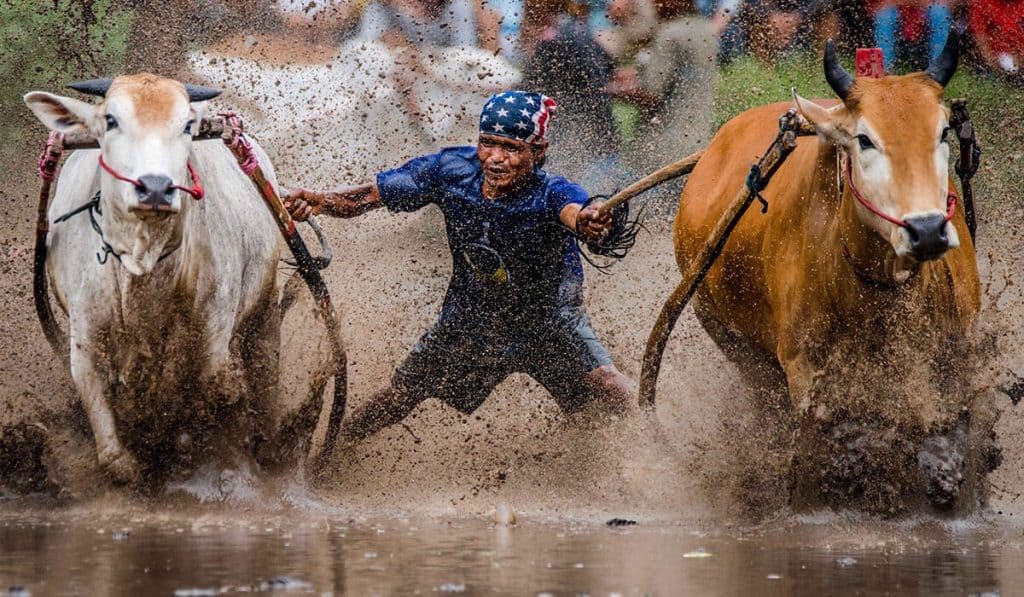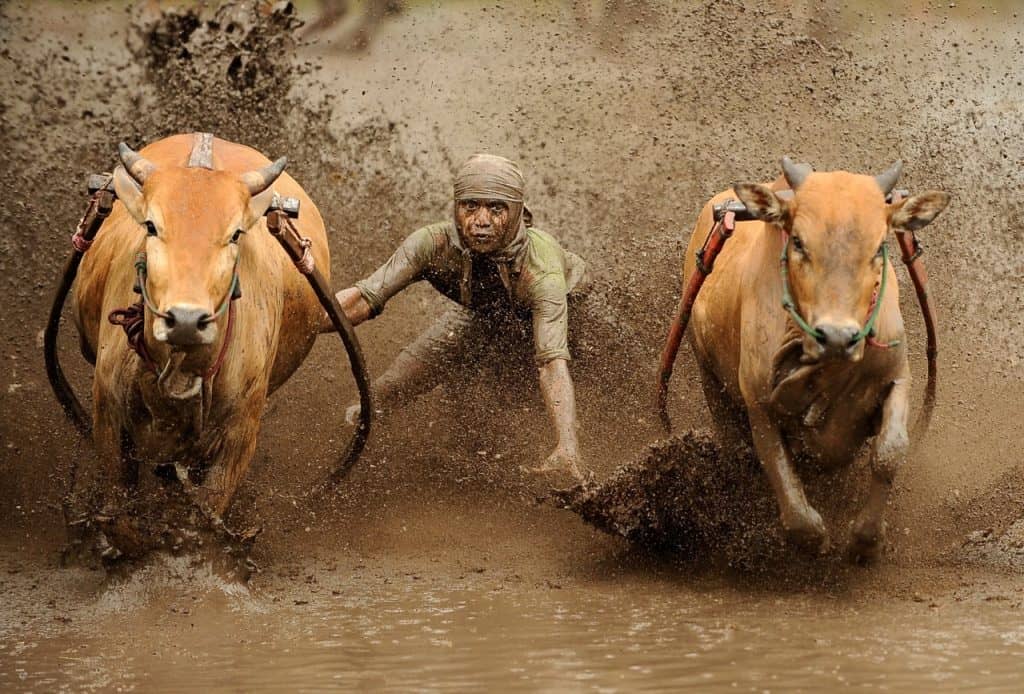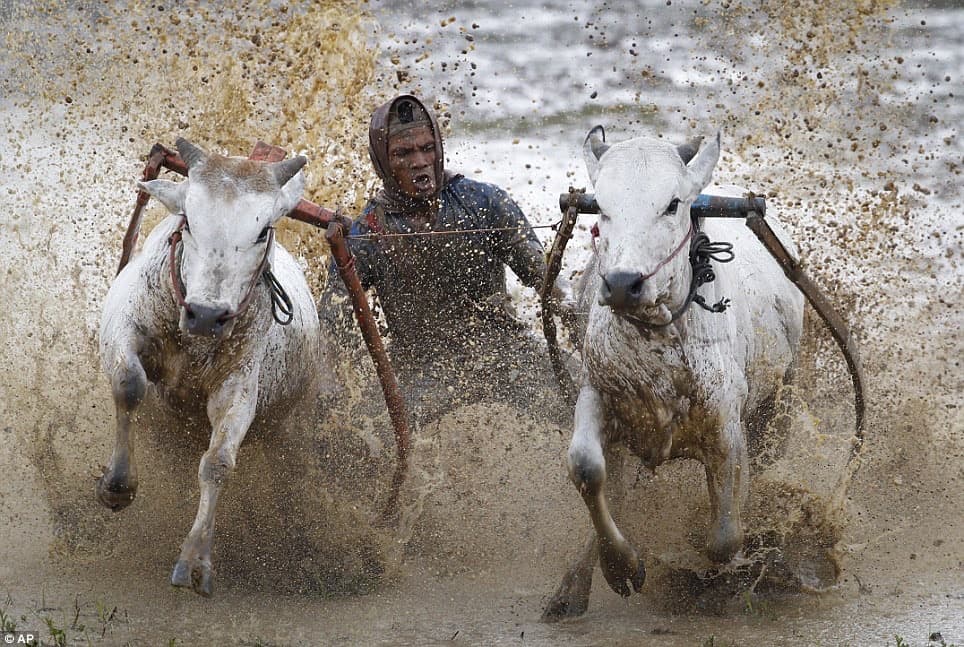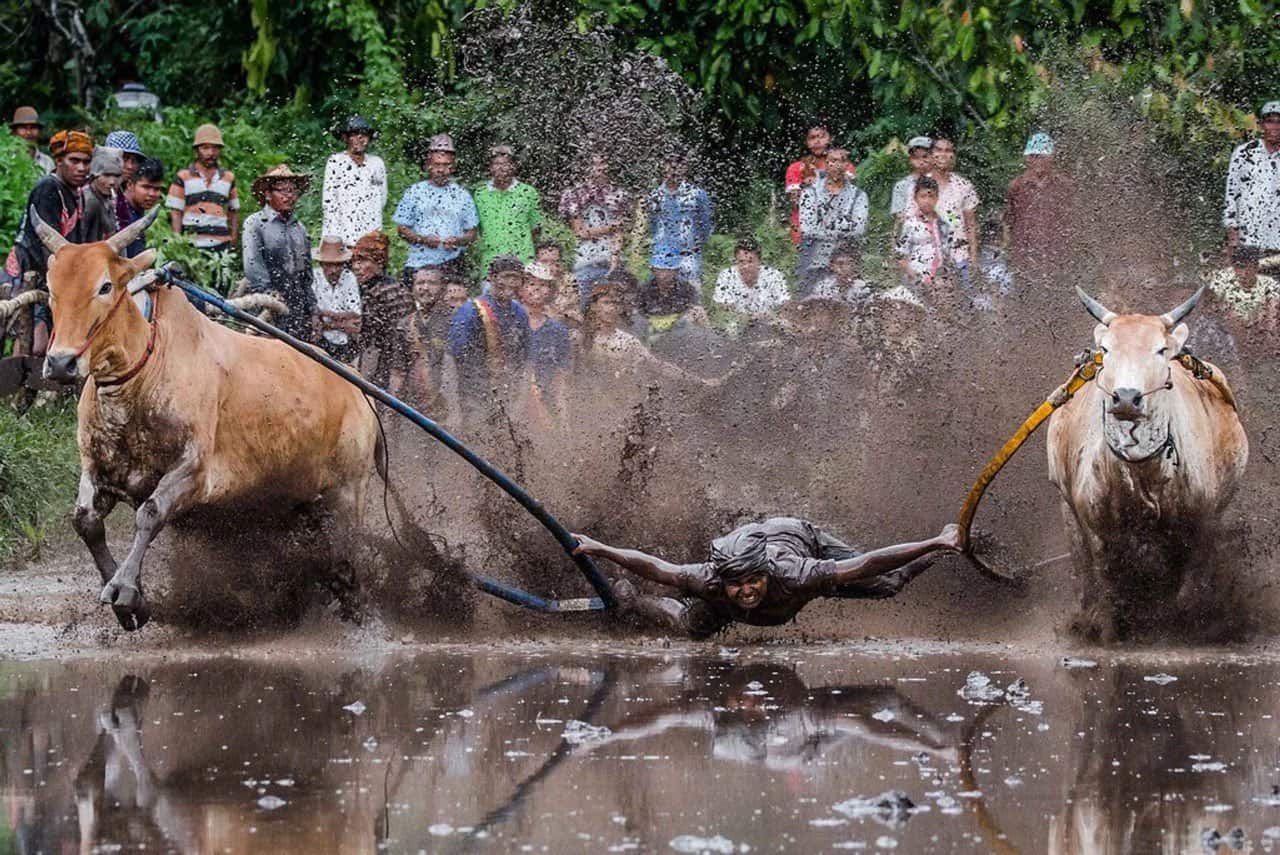The Indonesian Cow Racing Festival of Pacu Jawi
Every year in Indonesia, the local farmers of West Sumatra will hold a high-octane cow-racing festival.
In a tradition known as Pacu Jawi, hundreds of farmers will dual-wield their oxes to mark the end of the rice harvest.
Spectators will come from all over to watch these daredevil farmers as they race their cows through the muddy fields.
These bulls are incredibly strong, and the farmer jockeys will need the help of over 6 people to hold them back before the race starts.
Table of Contents
What is The Cow-Racing Festival of Indonesia
In Indonesia, cow racing, known as Pacu Jawi, is a traditional event that holds cultural significance primarily in the West Sumatra region, specifically in the Tanah Datar district. It’s far more than mere spectacle; it’s a nod to the agrarian roots of the community and a celebration of the cattle that play a significant role in traditional farming.
The event usually follows the rice harvesting season. It serves as both a form of entertainment and a method for demonstrating the strength and speed of the bulls, which could potentially increase their market value.
During Pacu Jawi, a pair of bulls are yoked together while a jockey stands on a wooden contraption connected to the animals. Rather than employing a conventional track, the bulls race through muddy, plowed rice fields. The jockey grasps the tails of the bulls for control and balance, a task requiring immense skill, strength, and coordination.
Unlike traditional races that focus purely on speed, Pacu Jawi is less about crossing a finish line first and more about demonstrating the skill of the jockey and the teamwork of the bulls. The ideal pair maintains a straight line and runs at a consistent speed. Though it’s competitive, it exudes a festival atmosphere complete with food stalls and local music.
The event is a vivid reflection of the community’s way of life, resonating far beyond its entertainment value. For locals, it’s a moment of collective identity and an avenue for social engagement. For visitors, it offers an insightful view into a unique cultural practice that goes beyond the usual tourist experience.

Where Is Pacu Jawi Held?
Pacu Jawi, the Indonesian Cow Racing festival, is held annually in local villages around in the Minangkabau highlands of West Sumatra.
You will need to search a little for the updated times and locations, however it was traditionally held to mark the end of the rice harvest.
These days, however, it is held more often as it has become a popular attraction for foreign tourists.
There are rotating locations in the Tanah Datar Regency including: Sungai Tarab, Rambatan, Limo kaum, and Pariangan.
You can see where Tanah Datar Regency is on a map here:
When Is Pacu Jawi Held?
Pacu Jawi, the Indonesian Cow Racing festival, was traditionally held to mark the end of the rice harvest.
It would be held twice a year in rotating villages in Western Sumatra.
These days however, it is held more and more often as it has become a popular attraction for foreign tourists.
This means that is likely to be held each weekend – you will just need to ask locally, when you arrive, where the festival is taking place that weekend.
The biggest celebrations will still be held during the end of the rice harvest, which is usually in April-May.

How Do You ‘Win’ Pacu Jawi?
Pacu Jawi is meant as a metaphor, representing how a leader and his people can all walk down the same path. That is why there are always two bulls in the race.
Interestingly, the winner of Pacu Jawi is not determined by the fastest racer, but rather by the farmer who can go in the straightest line.
In Pacu Jawi, the jockeys do not face off against one another. They compete against themselves. This is done to keep spectators from betting on the jockeys.

Can I visit Pacu Jawi?
The Pacu Jawi festival is generally open to the public, including international tourists. However, as it is a local event deeply rooted in community traditions, it’s essential to approach it respectfully and thoughtfully. Here are some suggestions for planning your visit:
Research and Timing
The festival typically occurs after the rice harvest, which can vary by year and location. Therefore, it’s prudent to do some research to find out the precise dates and locations. Local tourism offices and online resources can be helpful in this regard.
Logistics
The event usually takes place in rural areas, so you might need to arrange specific transport options to reach the location. Public transport may not always be the most reliable or convenient method, so consider hiring a car or joining a guided tour.
Etiquette
While the festival is a lively affair, it’s important to remember that this is a culturally significant event for the locals. Being mindful of customs and practices, such as appropriate attire and behavior, will not only make you a responsible traveler but also enhance your understanding of the event.
Safety
The race can be exhilarating but also unpredictable. Bulls can sometimes go off course, and the area can be quite muddy. Always keep a safe distance from the track, and pay attention to any advisories or instructions from organisers or local authorities.
Photography and Documentation
Before taking photos or videos, it’s polite to ask for permission, especially if you wish to capture close-up shots of the participants. A long lens can be useful for capturing the action from a distance.
By following these guidelines and approaching the experience with an open and respectful attitude, you’ll be better equipped to appreciate Pacu Jawi in its full cultural context.
You can find more Indonesia fun facts on The Life of Jord’s YouTube & TikTok accounts.
All of our fun facts are from the Around the World in 800 Facts series, by Jordan Simons.
If you have a country fact to contribute, please drop it in the comments below.

